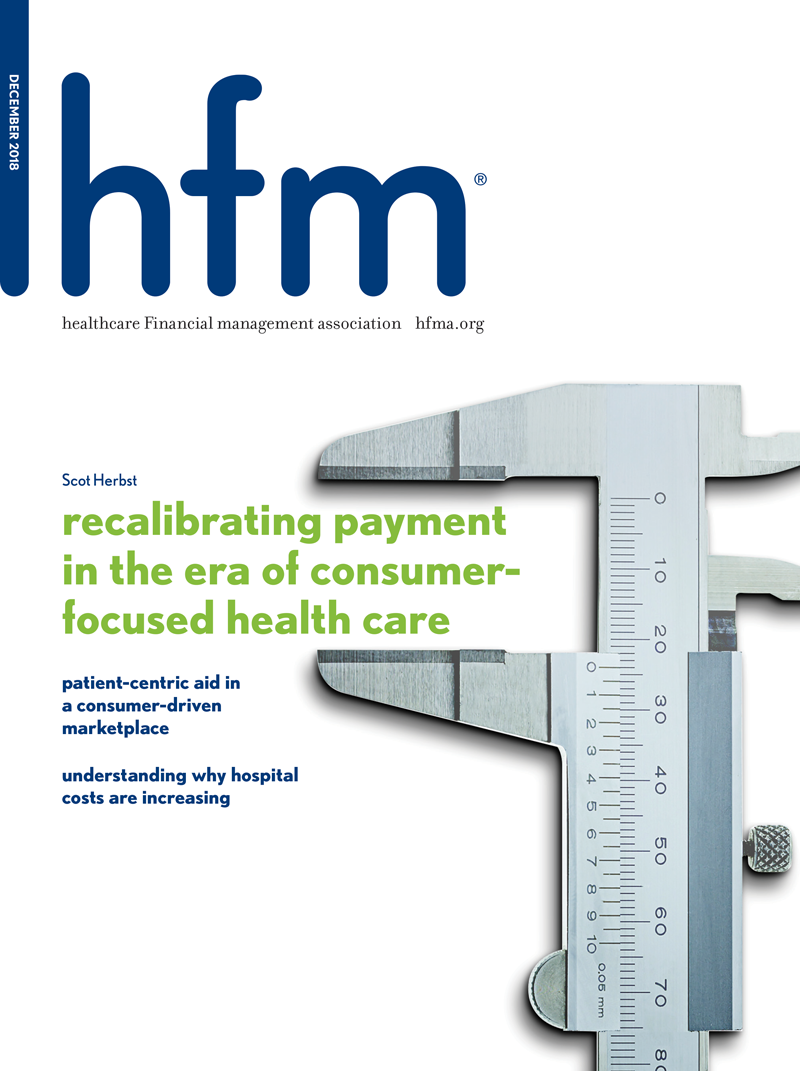
Cover Story
Recalibrating Payment in the Era of Consumerism
Among the key functions of an effective patient access program are to ensure patients receive clear and concise bills for their health care and to make those bills easy for patients to pay at the time of service.
By Scott Herbst
Web Exclusives
Bottom-Line Implications of New Lease Accounting Standards: What Healthcare Leaders Should Know
Healthcare organizations should be prepared for a lease accounting standard, effective in 2019, that changes the way they are required to report leases on their balance sheets.
By Bill Hanlon, Jay Miele, Jenna Magan, Mayling Leong, and Katie Proux
Population Health Management: Opportunities and Challenges for Captives
Healthcare providers can best manage the risk posed by population health management initiatives by forming captive health plans and acquiring reinsurance to cover potential catastrophic loss.
By Mark Troutman
Developing Talent in the Revenue Cycle
A health system created a training program for revenue cycle leaders, resulting in improved performance.
By Wendy Burns and Tina Abbey
Features
Patient-Centric Aid in a Consumer-Driven Marketplace
An adaptive financial assistance system that bills according to a patient’s economic situation can encourage better rates of patient payment.
By James Zadoorian, PhD, Thomas Bernadin, PhD, and Ashley Hodgson, PhD
Understanding Why Hospital Costs Are Increasing: It Depends on the Metrics
An analysis of factors driving increases in payment in the U.S healthcare industry, using Equivalent Discharges as the volume metric, finds that 84 percent of the increase are related to increased population and intensity of service.
By William O. Cleverley, PhD
Acquisition Versus Independence: Will Hospitals Continue Acquiring Physician Practices?
Small and solo physician practices are finding better ways of coping with administrative burdens, making it more practical, and desirable, to maintain or return to independence.
By Venkat Sharma
Focus Area
Revenue Cycle
Boston Children’s Journey to a Better Healthcare Payment Experience
An electronic payment system can help a hospital increase revenue.
By Kevin Pawl, MS, FACMPE
Columns
From the Chair
Imagining a More Consumer-Centric Approach to Patient Financial Communications
HFMA, the AHA, and AHIP have developed a guide for healthcare consumers designed to help them know how to avoid surprise out-of-network medical bills; healthcare organizations are encouraged to share the guide with their patients.
By Kevin Brennan, FHFMA, CPA
Eye on Washington
The 2018 Midterm Elections: Implications for Health Care
The healthcare industry could see some significant changes now that the balance of power in Washington D.C. has shifted.
By Ken Perez
Integration
Rebalancing the Portfolio
As they modify their strategies to account for change in 2019, healthcare organizations should consider how risks and rewards might have changed and where they might best redeploy their dollars.
By Keith D. Moore, MCP, and Dean C. Coddington
Captial Finance
Capital Markets 2018 Wrap-Up and Trends to Consider for 2019
The healthcare sectors’ extended access to abundant, low-cost, and relatively low-risk capital will change in 2019, and tracking four key issues will illuminate how those changes impact capital finance.
By Eric A. Jordahl
From the President
Work: The Cure For Political Overload
HFMA President and CEO Joe Fifer discusses why today’s healthcare challenges transcend politics—and the implications for healthcare finance leaders.
By Joseph J. Fifer, FHFMA, CPA
Department
Data Trends
2014-16 Trend Shows Continuing Decline in Self-Pay Admissions to Hospitals
An analysis finds a decline in the number of patients admitted to U.S. hospitals without healthcare insurance and an increase in beneficiaries of government-sponsored and commercial insurance plans.
Supplements
HFMA Research Report
The Path to a Patient-Centric Revenue Cycle
A research highlight that looks at key takeaways from a focus group of senior healthcare leaders about patient collections strategies.
Sponsored by Virence Health
Advertising
HFMA Trendsetter
GHX: Taking a Holistic View of Procure-To-Pay
An in-depth look at how one company is enabling more efficient procure-to-pay processes to streamline healthcare organizations’ financial operations.
Business Profile
Grant Thornton: Helping Organizations Embrace Robotic Process Automation
Two senior leaders at Grant Thornton talk about the advantages of robotic process automation to improve office efficiency, reduce costs, and mitigate risk.





